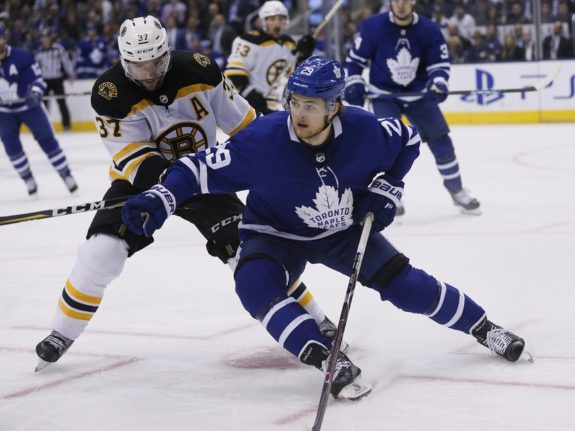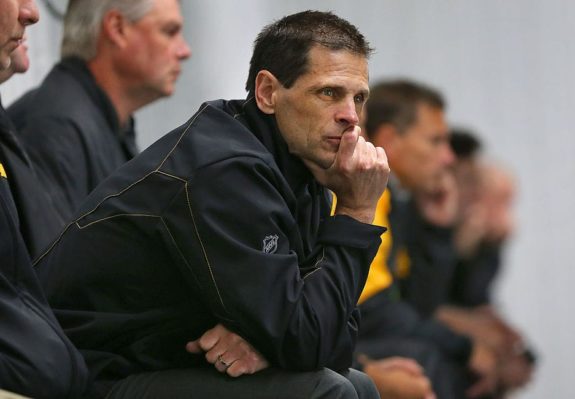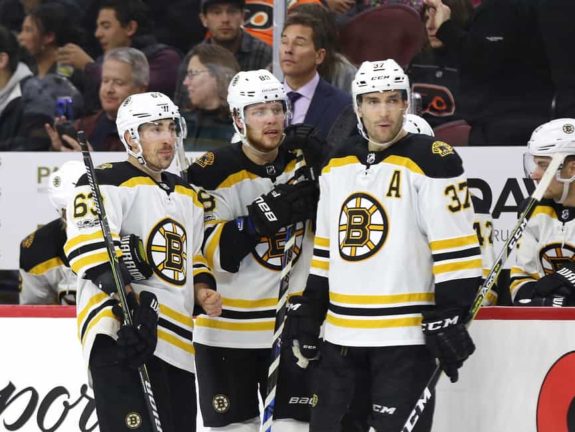Many analysts expected the playoff series between the Boston Bruins and Toronto Maple Leafs to take seven games. Still, the Bruins’ expectations remain the same as they were at the beginning of the regular season and playoffs: make it to the second round.
Now Boston finds itself in a do-or-die date with the Maple Leafs on Wednesday night at TD Garden. Coming into the series, Toronto was widely considered the underdog despite going 3-1 against the Bruins during the regular season. Many pointed to the hot streak of the team south of the border during the latter half of the season. Others suggested that the club residing north of the border was simply too young and not up to the challenge.

Nevertheless, here we are in Game 7. The Bruins dominated in Games 1 and 2 before claiming a 3-1 series lead. However, they have dropped two straight, allowing the Maple Leafs to crawl back into the series. While this pivotal game could go either way, Toronto has everything to gain while Boston has everything to lose.
Bruins’ Sweeney Goes All-In
General Manager Don Sweeney made a hefty acquisition with the trade deadline within shouting distance. On Feb. 25, the Bruins acquired Rick Nash from the New York Rangers in exchange for forwards Ryan Spooner and Matt Beleskey as well as defensive prospect Ryan Lindgren. They also tacked on a first-round draft pick in this summer’s NHL Entry Draft and a seventh-round pick in 2019.
This move made it clear that Sweeney was looking to push for a deep postseason run. Due to Boston’s salary-cap situation and Nash’s potential asking price, the power forward may simply slip away in free agency this offseason. Considering how much Sweeney gave up for No. 61, this investment would be considered a waste if the Bruins were to get knocked out of the playoffs early—especially in the first round.

Sweeney also added veterans Tommy Wingels (via trade) and Brian Gionta (via free agency). They also struck another deal with the Rangers for defenseman Nick Holden, giving up Rob O’Gara and the Bruins’ third-round pick of the 2018 NHL Entry Draft. While these were low-risk additions, especially compared to that of Nash, it was another indication that the bet was made—the Bruins were all-in.
Holden and Gionta, however, have gone missing. Holden appeared in one game during the postseason, replacing an injured Matt Grzelcyk, while Gionta hasn’t appeared in the series against Toronto at all. Though the latter two players were mainly brought on for depth, Sweeney’s recent transactions are under scrutiny and the only way to ease the tension is with a win in Game 7 and a second-round berth.
How the Expectation Was Set
We don’t need to go back further than last season to determine why a second-round appearance is so crucial. In the first round of the 2017 Stanley Cup Playoffs, the Bruins fell to the Ottawa Senators in just five games.
Not only does being tossed during the first round show signs of becoming stagnant, it even shows signs of regression. This year’s Bruins team is a whole lot better than the one last year. Rookies like Charlie McAvoy, Jake DeBrusk, Danton Heinen, Sean Kuraly and Grzelcyk have carved themselves starting roles with solid play. Brandon Carlo has also continued making a big impact as a top-four defenseman during his sophomore season.
On top of that is the combination of Brad Marchand, David Pastrnak and Patrice Bergeron, all three of whom scored 30 goals or more and led their team in points this season. Then you have David Krejci given the weapon of Rick Nash in late February, and the consistency of Riley Nash, Tim Schaller, and Noel Acciari as bottom-nine forwards.

The list goes on: Torey Krug has had a stellar year, further proving his ability to quarterback the power play while coming up big in the Bruins’ own zone. Kevan Miller found another gear this season, growing the offensive side of his game when he has been better known for his physical style of play in the past. Even Zdeno Chara, who receives more than his fair share of criticism, has proven that he is still capable of playing top-pair minutes as a 40-year-old defenseman in the NHL. He even earned a contract extension with the Bruins in March.
Then there’s Tuukka Rask, who has been phenomenal, sporting a 21-6-2 regular-season record since New Year’s Day. Though he (as well as the rest of the Bruins) struggled early on in the 2017-18 campaign, Rask has turned on the jets and came into the postseason hot. No. 40 is the only reason Boston has been able to stay in every game during the Maple Leafs series.
All of this boils down to one thing: the Bruins need to win this series and make a solid playoff push. If not, it’s back to the drawing board. Other than continuing to let their young players grow, management will be scratching their heads with what else is needed for Boston to succeed in the postseason.